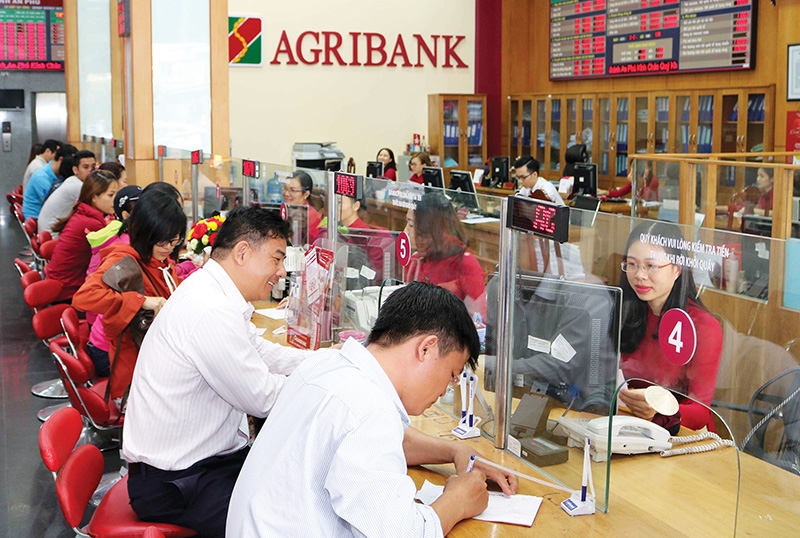Divestment slow off the blocks for banks
 |
| SOEs must complete the sale of shares within four months, photo Le Toan |
State-owned lender Agribank has been stuck for years with divestment efforts because its real estate assets could not be approved by the Ministry of Finance due to their large size and complex procedures.
“At the end of last year, the Ministry of Finance also made a comprehensive assessment on the equitisation goal of state-owned enterprises. Specifically, only about 28 per cent of enterprises were equitised, which means that nearly three-quarters did not meet the plan. The main issue is that many large corporations’ land use rights remain unclear, as can be seen in the cases of VNPT and Agribank,” explained Chu Manh Hung, deputy head of the Equitisation Department at Agribank.
“Since the equitisation plan during 2016-2020 has not been completed yet, Agribank will continue carrying out this task for the 2021-2025 period,” he added. “However, there are still major roadblocks hampering the process, associated with determining the value of land and affiliated enterprises.”
While Agribank has been constantly pushing the equitisation process, the complex valuation procedures have been a major obstacle slowing down progress. The bank also has to cope with the myriad challenges arising from its large number of affiliated enterprises, multi-level authorisations required, as well as delayed approval of land use schemes.
Agribank has a total of around 294 real estate properties with a total area of 2.6 million square metres, with diverse origins and incomplete legal documents. While these assets can help the bank’s equitisation value reach record levels and enhance its efficiency, they have also delayed divestment for years.
“Agribank currently has more than 100 land plots with unclear legal status. We hope to receive support from relevant units and agencies to quickly equitise this large volume of assets,” Hung told VIR.
Despite its ongoing equitisation, Agribank jumped 17 spots to rank 173rd in the recently-announced Brand Finance Banking 500 list for 2021, which featured the most valuable and strongest banking brands in the world.
As of December 31, Agribank’s total assets reached nearly VND1.57 quadrillion ($68.26 billion), with its capital exceeding VND1.45 quadrillion ($63 billion). According to Brand Finance, as governments scramble to stimulate economic growth in the face of the ongoing global health crisis, and profits and interest rates taking a hit, nearly two-thirds of the world’s 500 most valuable banking brands have recorded brand value losses.
As per Decree No.01/2014/ND-CP released in 2014 on foreign investors’ purchase of shares of Vietnamese credit institutions, a foreign strategic investor shall not hold more than 20 per cent of the charter capital of a Vietnamese credit institution. Foreign investors shall not hold more than 30 per cent of the charter capital of a Vietnamese commercial bank.
Besides Agribank, other local lenders have been enjoying the attentions of foreign partners looking to increase their footprint in Vietnam.
In 2019, a strategic co-operation between Vietnamese bank BIDV and South Korean KEB Hana Bank turned the former into the lender with the largest market capitalisation in Vietnam with around $1.73 billion. KEB Hana invested capital in exchange for a 15 per cent stake in BIDV, while BIDV received long-term technical assistance from the South Korean lender and its parent company, Hana Financial Group. The tie-up also quenched the bank’s thirst for capital as BIDV announced it has now satisfied Basel II requirements.
Elsewhere, Singapore’s sovereign wealth fund GIC in 2019 purchased over 94 million new shares and now owns a 2.55 per cent stake in Vietcombank. Mizuho, one of the largest Japanese financial services providers purchased an additional 16.6 million new shares to maintain its existing 15 per cent stake in the bank.
“The equity investment by GIC and Mizuho increases Vietcombank’s charter capital and creates a solid capital buffer for the bank to meet capital requirements under Basel II Accord as well as maintain its leading position in the Vietnamese banking sector,” a GIC representative stated.
Last year, the International Finance Corporation (IFC), a member of the World Bank Group reduced its stake in VietinBank by 1.5 per cent, following an earlier divestment.
The IFC and equity subsidiary IFC Capitalization Fund also reduced their combined ownership in VietinBank from almost 6.49 to 4.99 per cent last year, leaving more room for other foreigners.
Besides the IFC, Japanese financial institution Bank of Tokyo-Mitsubishi UFJ holds 19.73 per cent in the state-run bank. However, VietinBank has not signalled any new potential partnerships since IFC pulled out.
On the other hand, under Vietnamese regulations, state-owned enterprises (SOEs) must complete the sale of shares within four months of having their equitisation plans approved. This time limit may not be enough for overseas investors to conduct due diligence and negotiate representations and warranties, special rights, and other conditions for share acquisitions with the authority representing state capital in the SOE, according to ASCV Legal.
What the stars mean:
★ Poor ★ ★ Promising ★★★ Good ★★★★ Very good ★★★★★ Exceptional
Related Contents
Latest News
More News
- Private capital funds as cornerstone of IFC plans (February 20, 2026 | 14:38)
- Priorities for building credibility and momentum within Vietnamese IFCs (February 20, 2026 | 14:29)
- How Hong Kong can bridge critical financial centre gaps (February 20, 2026 | 14:22)
- All global experiences useful for Vietnam’s international financial hub (February 20, 2026 | 14:16)
- Raised ties reaffirm strategic trust (February 20, 2026 | 14:06)
- Sustained growth can translate into income gains (February 19, 2026 | 18:55)
- The vision to maintain a stable monetary policy (February 19, 2026 | 08:50)
- Banking sector faces data governance hurdles in AI transition (February 19, 2026 | 08:00)
- AI leading to shift in banking roles (February 18, 2026 | 19:54)
- Digital banking enters season of transformation (February 16, 2026 | 09:00)

 Tag:
Tag:



















 Mobile Version
Mobile Version